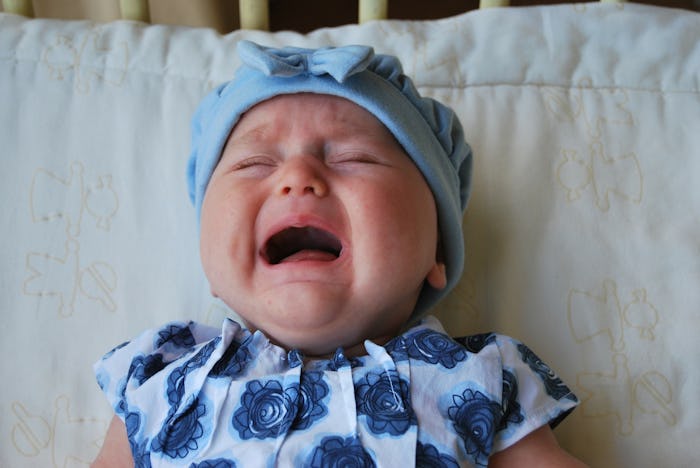Everywhere you look — commercials, print ads, Instagram feeds, films — babies are portrayed happily sleeping or waking up in their cribs. It all seems natural and picturesque, so why does your own baby refuse to sleep in his crib, giving you no rest until you finally cave and extract him from the torture chamber? Befuddled parents everywhere wonder, "why does my baby hate their crib?" when every image you see of infancy depicts otherwise.
It turns out, it's not just you. The popular depiction of the baby who would rather sleep in her crib than anywhere else inaccurately represents the natural biological process. In an interview with Romper, veteran Lactation Consultant Leigh Anne O'Connor says "babies are hard-wired to sleep next to their parents. They have an instinct to cry out searching for protection from predators. We also know that babies' body temperature, heart rate and respiration are all regulated when they are skin-to-skin with their parent."
Sound far-fetched? Think about it: Had your baby been born in either another time in history, or in another place on the globe today, the potential for animal predators would be a very real risk. An infant human does not come out of the womb feeling safe being alone, because for the vast majority of human history, they weren't safe when alone. Needing the presence of a parent protector is natural and normal.
Monique Cowan, Postpartum Doula and Family Coach, confirms O'Connor's claim that babies rely on their mothers to help regulate their biology. "While sleeping," Cowan tells Romper, "a baby's breathing and heartbeat can be regulated by its mother's by being close to her. So, sleeping near their parents can actually save a baby's life."
That doesn't mean your baby can't or shouldn't learn to sleep independently when the time is right, but getting used to being alone in a crib will often take some time and patience on the part of the parent. Sarah Brown, a sleep wellness expert at Mattress Firm, tells Romper that babies need routine to learn that their crib is a safe place to rest. Brown says, "Never punish them by putting them in their crib or put them there when they are crying because they will learn that it's a place to go when they are inconsolable." Above all, the idea is to help them associate their crib with feelings of peace and safety.
If your baby hates her crib, take heart: It probably means she feels safe and cozy with you, which means you are doing an awesome job. Having patience and keeping a sense of humor about it is key, and remember: slowly but surely she'll get more comfortable with it as time goes on. Until then, at least you have coffee.
